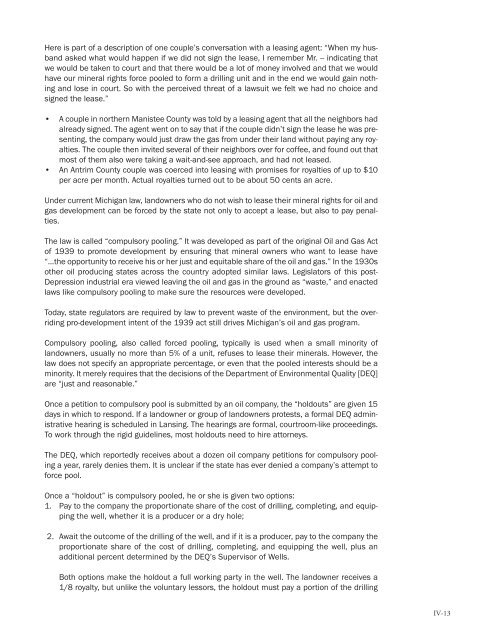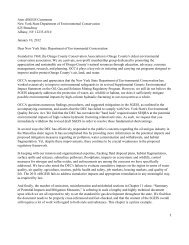Oil and Gas at Your Door? (2005 Edition) - Earthworks
Oil and Gas at Your Door? (2005 Edition) - Earthworks
Oil and Gas at Your Door? (2005 Edition) - Earthworks
Create successful ePaper yourself
Turn your PDF publications into a flip-book with our unique Google optimized e-Paper software.
Here is part of a description of one couple’s convers<strong>at</strong>ion with a leasing agent: “When my husb<strong>and</strong><br />
asked wh<strong>at</strong> would happen if we did not sign the lease, I remember Mr. -- indic<strong>at</strong>ing th<strong>at</strong><br />
we would be taken to court <strong>and</strong> th<strong>at</strong> there would be a lot of money involved <strong>and</strong> th<strong>at</strong> we would<br />
have our mineral rights force pooled to form a drilling unit <strong>and</strong> in the end we would gain nothing<br />
<strong>and</strong> lose in court. So with the perceived thre<strong>at</strong> of a lawsuit we felt we had no choice <strong>and</strong><br />
signed the lease.”<br />
• A couple in northern Manistee County was told by a leasing agent th<strong>at</strong> all the neighbors had<br />
already signed. The agent went on to say th<strong>at</strong> if the couple didn’t sign the lease he was presenting,<br />
the company would just draw the gas from under their l<strong>and</strong> without paying any royalties.<br />
The couple then invited several of their neighbors over for coffee, <strong>and</strong> found out th<strong>at</strong><br />
most of them also were taking a wait-<strong>and</strong>-see approach, <strong>and</strong> had not leased.<br />
• An Antrim County couple was coerced into leasing with promises for royalties of up to $10<br />
per acre per month. Actual royalties turned out to be about 50 cents an acre.<br />
Under current Michigan law, l<strong>and</strong>owners who do not wish to lease their mineral rights for oil <strong>and</strong><br />
gas development can be forced by the st<strong>at</strong>e not only to accept a lease, but also to pay penalties.<br />
The law is called “compulsory pooling.” It was developed as part of the original <strong>Oil</strong> <strong>and</strong> <strong>Gas</strong> Act<br />
of 1939 to promote development by ensuring th<strong>at</strong> mineral owners who want to lease have<br />
“...the opportunity to receive his or her just <strong>and</strong> equitable share of the oil <strong>and</strong> gas.” In the 1930s<br />
other oil producing st<strong>at</strong>es across the country adopted similar laws. Legisl<strong>at</strong>ors of this post-<br />
Depression industrial era viewed leaving the oil <strong>and</strong> gas in the ground as “waste,” <strong>and</strong> enacted<br />
laws like compulsory pooling to make sure the resources were developed.<br />
Today, st<strong>at</strong>e regul<strong>at</strong>ors are required by law to prevent waste of the environment, but the overriding<br />
pro-development intent of the 1939 act still drives Michigan’s oil <strong>and</strong> gas program.<br />
Compulsory pooling, also called forced pooling, typically is used when a small minority of<br />
l<strong>and</strong>owners, usually no more than 5% of a unit, refuses to lease their minerals. However, the<br />
law does not specify an appropri<strong>at</strong>e percentage, or even th<strong>at</strong> the pooled interests should be a<br />
minority. It merely requires th<strong>at</strong> the decisions of the Department of Environmental Quality [DEQ]<br />
are “just <strong>and</strong> reasonable.”<br />
Once a petition to compulsory pool is submitted by an oil company, the “holdouts” are given 15<br />
days in which to respond. If a l<strong>and</strong>owner or group of l<strong>and</strong>owners protests, a formal DEQ administr<strong>at</strong>ive<br />
hearing is scheduled in Lansing. The hearings are formal, courtroom-like proceedings.<br />
To work through the rigid guidelines, most holdouts need to hire <strong>at</strong>torneys.<br />
The DEQ, which reportedly receives about a dozen oil company petitions for compulsory pooling<br />
a year, rarely denies them. It is unclear if the st<strong>at</strong>e has ever denied a company’s <strong>at</strong>tempt to<br />
force pool.<br />
Once a “holdout” is compulsory pooled, he or she is given two options:<br />
1. Pay to the company the proportion<strong>at</strong>e share of the cost of drilling, completing, <strong>and</strong> equipping<br />
the well, whether it is a producer or a dry hole;<br />
2. Await the outcome of the drilling of the well, <strong>and</strong> if it is a producer, pay to the company the<br />
proportion<strong>at</strong>e share of the cost of drilling, completing, <strong>and</strong> equipping the well, plus an<br />
additional percent determined by the DEQ’s Supervisor of Wells.<br />
Both options make the holdout a full working party in the well. The l<strong>and</strong>owner receives a<br />
1/8 royalty, but unlike the voluntary lessors, the holdout must pay a portion of the drilling<br />
IV-13




